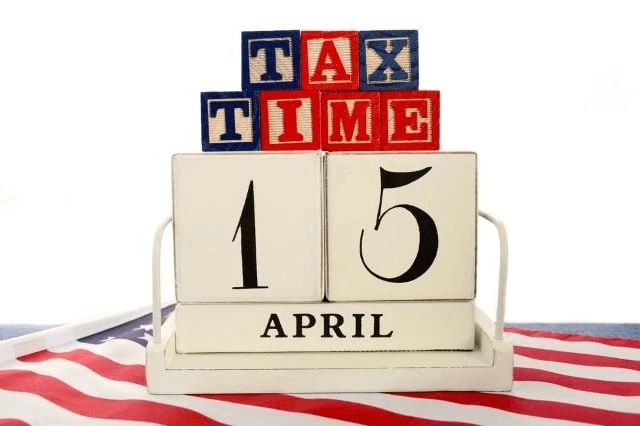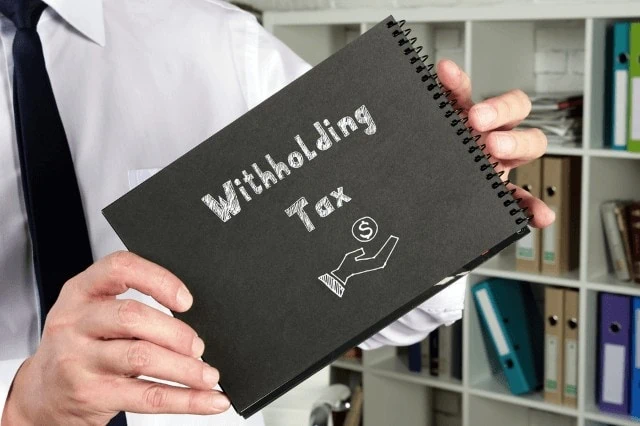Tax season is here. But if you’re like me, doing your taxes is the last thing on your mind right now. Taxes aren’t due until April 15 this year (April 17 for residents of Maine and Massachusetts), so why bother with that headache now when you can kick the can down the road for a couple of months.
Here’s why: There are several benefits to filing your tax return early (or at least getting it ready to file). You could cut your tax bill, avoid identity theft, get paid sooner, reduce stress, and more just by doing something now that you’ll have to do soon anyway.
So, for all my fellow procrastinators, let me try to convince you (and myself) to bite the bullet and file your tax return early this year by pointing out the benefits of filing your tax return early. If we’re all aware of the advantages, we might just see the light and get moving now.
Related: 10 Worst IRS Problems Taxpayers Will Face This Year
Table of Contents
What’s Considered an Early Tax Return?

Before jumping into the benefits of filing your taxes early, let’s quickly define what it means to file “early.”
This year’s tax season officially started on Jan. 29, 2024. That’s the day the IRS began accepting and processing federal income tax returns for the 2023 tax year.
However, if you’re using commercial tax software to file your return (e.g., TurboTax or H&R Block), you could have completed your return earlier than Jan. 29. In that case, the software company would have held your return until the IRS started processing them.
In addition, the IRS Free File program opened on Jan. 12, 2024. If you completed your return before the official start of tax season using commercial software provided by a Free File partner, your return would have been held until Jan. 29.
Since you could have completed your federal income tax return in mid-January, let’s say an “early” tax return is anything completed and filed from that point until the end of February. That means roughly within the first three weeks after tax season “officially” begins.
So, what are the benefits of filing your taxes early?
Related: New 1099-K Threshold Delayed (Again): How Are You Impacted?
1. You’ll Have More Time to Find a Tax Preparer

To start, you’ll have more time to find a tax preparer.
If you’re going to hire someone to do your taxes this year, you don’t want to wait until the last minute to find a tax preparer. The best tax professionals get booked up quickly. So, if you don’t want to pick a preparer from the bottom of the barrel, move to the front of the line and get your return done early.
Plus, if you wait too long, you might not be able to find anyone at the last minute who can handle your return. If you stroll into a tax preparer’s office in March or April, don’t be surprised if you’re turned away.
2. Your Tax Software Might Be Cheaper

The commercial tax software providers have a habit of raising their prices toward the end of tax season. This isn’t always disclosed up front, either. So, pay close attention if you do file later.
However, the best way to avoid this sort of price increase is to complete your return early if you plan to use one of these software products (you might even get a discount). And before you pick a software provider, check out our list of the best tax software for 2024.
3. You’ll Get Your Tax Refund Faster

The sooner you file your federal tax return, the sooner the IRS can start processing any tax refund you’re owed. If you e-file your return and sign up for direct deposit, you’ll typically get your tax refund within 21 days (assuming there are no errors). It can take a month or more if you file a paper return and/or request a paper refund check in the mail. But either way, filing early will start the clock sooner rather than later.
There’s also another reason why filing early can speed up your tax refund. As tax season progresses, the IRS’s workload increases, which can result in processing delays that might delay your tax refund (especially if you file a paper return and request a paper refund check). Early filers stay ahead of the tax return tsunami that slows down the IRS each year.
4. You’ll Reduce the Chance of Tax Fraud

A common tax fraud scheme that pops up every year that goes like this:
Someone steals your personal information and files a fraudulent tax return in your name. Of course, the bogus return requires a tax refund that’s sent to the thief. You subsequently file a legitimate tax return. However, the IRS flags your return because it already received the fake return using your personal information. The crook has already received a refund, while you’re bogged down dealing with the IRS and trying to figure out what’s going on with your lawful tax return.
Filing early can prevent this nightmare scenario. That’s because there’s a much better chance the IRS will get your tax return first. So, when the criminal files a second return in your name, the IRS will reject that one—not yours.
WealthUp Tip: If you’re the victim of tax-related identity theft, respond immediately to any IRS notices you receive in the mail (e.g., call the number provided). The IRS won’t contact you by phone, email, or text. If your e-filed return is rejected because a duplicate return was filed using your Social Security number, or if the IRS instructs you to do so, complete an identity theft affidavit using Form 14039. To prevent future problems, request an Identity Protection PIN, which is a six-digit number that prevents other people from filing a return using your personal information.
5. You’ll Have Opportunities to Lower Your Tax Bill

You can contribute to an individual retirement account (IRA) or health savings account (HSA) for the 2023 tax year all the way up until April 15, 2024 (April 17 if you live in Maine or Massachusetts). So, if you haven’t already reached the 2023 contribution limits for either of those two types of accounts, you still have time to save a bit more for 2023.
Plus, you may qualify for a tax deduction on the federal tax return due this year for contributions to a traditional IRA or HSA assigned to 2023. You might also be able to claim the Saver’s Credit on the return you file this year for 2023 contributions to an IRA.
So, what does all this have to do with filing your tax return early? If you fill out your 2023 tax return now (but don’t submit it yet) and see that you owe taxes this year, you’ll still have a couple of months to scrape up some more money to put in a traditional IRA or HSA. When you eventually send your return to the IRS, you’ll likely be able to claim a deduction, and possibly the Saver’s Credit, which will bring your tax bill down (and maybe even trigger a refund).
On the other hand, if you wait until the last minute to fill out your 1040 form, you might not have time to pull together the funds necessary to claim a tax deduction or credit. In that case, you’ll end up paying more in tax.
WealthUp Tip: If you put money in an IRA or HSA this year for the 2023 tax year, make sure you let the account administrator know that your contribution is for 2023.
6. You’ll Have More Time to Pay Any Tax Due

You might also need time to dig up some additional cash to pay any taxes you owe. Even if you file your return now, you still have until April 15 to pay any tax owed (taxpayers living in Maine and Massachusetts have until April 17 to pay). The earlier you complete your return and determine exactly how much tax is due, the more time you’ll have to figure out how you’re going to pay the bill.
What if you can’t pay by the April 15 deadline? You can apply online for a payment plan, or request an installment plan using Form 9465. If you have an “undue hardship” (i.e., you’ll have a substantial financial loss if you pay your tax when it’s due), you can ask the IRS to extend your payment deadline using Form 1127. Other, more complicated options include requesting an “Offer in Compromise” or a temporary delay of the collection process.
Related: 8 Free Tax Filing Options for 2024
7. You Can Adjust Your Withholding Sooner

Ideally, the income taxes withheld from your wages during the year will come pretty close to your tax liability for that year. If that’s not the case, you’ll probably end up having to write a big check to the IRS at tax time (which nobody wants to do), or you’ll get a large tax refund (which essentially means you gave Uncle Sam an interest-free loan for the year).
If you get either a tax bill or a big tax refund this year, you can avoid the same problem when you file next year’s tax return by adjusting the income tax withheld from each paycheck this year. To do this, simply give your employer a new W-4 Form and make sure all tax credits and tax deductions that you qualify for are reflected.
Filing early means you’ll know what your tax bill or tax refund is sooner, which will give you more time to submit a new W-4 form. You’ll also have more information about deductions and credits available, which will help you calculate a more accurate withholding amount. In addition, if you don’t want a huge change to your current paycheck, filing a new W-4 form earlier in the year will translate into a smaller per-paycheck adjustment.
8. You’ll Have Tax Information Available for Applications

If you’re about to buy a house and need a mortgage, you’ll probably have to provide information from your tax return to complete a loan application. The same could be true if you’re moving to a new apartment and need to fill out a rental application. You might need to provide tax returns to qualify for certain government assistance programs, too.
Don’t put these or other applications on hold until April. Filing your tax return early will allow you to complete any applications that require 2023 tax information now.
Related: Child Tax Credit FAQs [What Every Parent Needs to Know]
9. You Won’t Be Stressing About Taxes Any Longer

Do you really want to be worrying about taxes for the next few months? Tax season can be stressful. But once you file your return, the anxiety that goes along with the whole tax filing process melts away.
Thus, filing your tax return early reaps not just financial benefits, but emotional benefits, too. When it’s done, you can sit back, relax, and enjoy life without having to fret over taxes (assuming you’re not audited!).
Plus, once spring arrives and the weather gets warmer, the last thing you’re going to want is to be stuck inside dealing with tax forms, tax preparers, or the IRS.
When Not to File Early

There are some circumstances under which you probably don’t want to file your tax return early. For example, you might want to wait to file if any of the following apply:
- You haven’t received all your necessary tax documents, such as W-2, 1099, or K-1 forms.
- You need more time to fund an IRA, HSA, SEP IRA, or solo 401(k).
- You have a family crisis or similar reason why you can’t focus on your tax return in January or February.
- You need to do some tax research to file an accurate return.
- There’s a change in the law at the beginning of the year that impacts your tax return, but the new law isn’t accounted for in the current tax forms.
- The IRS urges certain taxpayers to delay filing until it can issue guidance on a particular issue.
However, even if you wait to file your tax return, that doesn’t necessarily mean you should wait to start your return. That way you can spread out the work and avoid a last-minute crunch.
What If You Need More Time to File?

If you do wait to file your federal tax return, you’re still expected to file it by the April 15 deadline (April 17 if you live in Maine or Massachusetts). However, if you can’t file your return before the deadline for any reason, you can request an automatic six-month tax filing extension by submitting Form 4868 or making an electronic tax payment to the IRS. That will push your filing deadline to Oct. 15.
Just remember that an extension is only for filing your tax return—not for paying any tax due. So, if you expect to owe taxes this year, estimate the tax you’ll owe and pay that amount by the April 15 or 17 deadline.
Related:





![Child Tax Credit FAQs [What Every Parent Needs to Know] 26 child tax credit parents kissing baby](https://wealthup.com/wp-content/uploads/child-tax-credit-parents-kissing-baby-600x403.webp)


